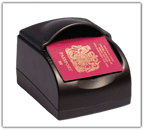U.S. State Department advances NXP technology for e-passport program
05 September, 2006
category: Biometrics, Government
NXP, formerly Philips Semiconductors, has been tapped as one of the suppliers of the United States’ new e-passport project. The company’s SmartMX passport chip solutions meet the ICAO data security and access standard selected for the security in new passports. This standard prevents illicit reading of e-passports by requiring that the passport be physically open and presented to an authorized reader at a customs border crossing point.
Company’s secure smart chip technology now powers 30 out of 36 ePassport programs globally
Eindhoven, The Netherlands–NXP, the newly independent semiconductor company founded by Philips, announced that the United States Department of State has chosen NXP as one of its suppliers of secure semiconductor technology for its new electronic passport (ePassport) program. The new passports, designed to enhance border security and to facilitate international travel of U.S. citizens, contain secure contactless smart chip technology inside the cover. They can be scanned at authorized passport control points to speed the authentication process and increase security. The new ePassports will be rolled out across the United States by the end of the first quarter of 2007.
The new U.S. passport is similar to today’s passport with the addition of a small contactless smart chip. The chip securely stores the same data visually displayed on the photo page of the passport, and will also include a digital photograph. The photograph enables biometric comparison to ensure that the bearer of the passport is the person to whom it was issued by his or her government. The new passport will also incorporate additional anti-fraud and security features to further enhance national security.
The State Department has also included a number of features to address privacy issues and to ensure the safe-keeping of information. The read range of the contactless smart chip is only a few centimeters and special shielding material has been built into the cover to prevent communication with the chip while the cover is closed. In addition, the ICAO (International Civil Aviation Organization) basic access control (BAC) standard is used to prevent skimming and eavesdropping (attempts to read the contactless high frequency communication between the passport chip and the reader device at the border control station). These combined features will mitigate the potential for unauthorized reading of the ePassport.
NXP is being used in more than 80 percent of all smart passport implementations globally. Thirty countries including the U.S have selected the secure, contactless smart chip technology from NXP. Other countries using NXP technology include Austria, France, Germany, New Zealand and Singapore. For the U.S. ePassport program NXP is supplying its chip technology to the smart card manufacturer Gemalto, who has the overall lead for providing secure smart card packages for the ePassports. Gemalto’s package was recently selected by the State Department for final test and evaluation, a precursor to volume orders and issuance to the U.S. public.
“Security, performance and reliability are the key factors for e-passport program consideration,” said Frans van Houten, president and CEO, NXP. “The selection by the U.S. State Department and 29 other national governments around the globe is a strong endorsement of our global leadership in this semiconductor segment, and we look forward to long-standing relationships in delivering this important technology.”
NXP’s SmartMX passport chip solutions meet the ICAO BAC data security and access standard, selected for the security in new passports. The BAC standard prevents illicit reading of e-passports by requiring that the passport be physically open and presented to an authorized reader at a Customs border crossing point. The official must first scan the Machine Readable Zone (MRZ) of the passport, obtaining a key that authenticates the passport contactlessly, and only then transmits the passport holder’s information via a secure, encrypted communication.
About NXP SmartMX passport chips
NXP SmartMX passport chips have received the highest level of security certification awarded to secure smart IC solutions available – the Common Criteria EAL5+ certification by the German Federal Office of Information Security. It fully supports and even exceeds the specifications for smart passports set by the International Civil Aviation Organization (ICAO).
The high-performance chip features NXP’s unique ultra low power handshaking technology, enabling an exceptional operating range by fully meeting the ISO/IEC14443 standard power range requirements. The experience of over 700 millions contactless NXP modules in the market is the basis for the expertise on contactless IC applications.
The 72Kbyte EEPROM memory, high-security chip is specifically designed to fulfill the needs of eGovernment projects, with its high memory capacity able to hold biometric information such as fingerprints and facial images. Additionally, the IC is highly reliable, with a data retention time of 20 years that doubles the industry standard.
About NXP
NXP is a top 10 semiconductor company founded by Philips more than 50 years ago. Headquartered in Europe, the company has 37,000 employees working in 20 countries across the world. NXP creates semiconductors, system solutions and software that deliver better sensory experiences in mobile phones, personal media players, TVs, set-top boxes, identification applications, cars and a wide range of other electronic devices. News from NXP is located at www.NXP.com.



